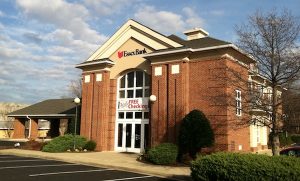A local bank has taken a big step toward getting out from under TARP.
Community Bankers Trust, the Glen Allen holding company of Essex Bank, said Wednesday that it had spent $4.5 million to pay back about a quarter of the money it received from the U.S. Treasury as part of the TARP Capital Purchase Program.
The bank took $17.6 million in TARP capital in late 2008. The program was meant to prop up healthy banks during the recession. But major losses at Essex in 2009, 2010 and 2011 delayed its ability to get out of the program. Now, after a turnaround last year and steady profits, the bank is making its move.
Community Bankers Trust chief executive Rex Smith said the bank plans to make quarterly payments of at least $2.25 million until it has bought its way completely out of the program.
Smith said he’s proud that his $1.1 billion bank was able to take this step without having to raise additional capital, a move that many of Essex’s peers have made and that can dilute the stakes of longtime stockholders.
“We did not do that to our shareholders and made it through and made the earnings. I think that’s big,” Smith said. “You get yourself healthy, get your earnings up straight and get yourself out of debt.”
Essex worked with regulators to devise a payment plan for TARP, Smith said, and received the green light for this first payment. Regulators want to make sure the payments don’t dent the bank’s capital base.
The plan is to have the remaining $13.1 million in TARP paid off by the end of 2014.
“And possibly, as it gets into next year and hopefully our earnings continue to increase … there’s potential to accelerate that,” Smith said.
That confidence is fueled by $5.5 million in profit last year and a $1.04 million profit in the first quarter of 2013. That’s a result of growth in business lending and work to minimize bad loans and clean soured loans off the books, Smith said.
“Those problem assets cost a lot of money,” he said. “They take a lot of time and manpower.”
The turnaround also helped Essex get released from its written agreement with regulators in December.
The bank recently finalized the acquisition of a branch in Annapolis, Md. It is renovating the space, which had been owned by PNC Bank.
Eight local banks participated in TARP when it was created. Besides Essex, Village Bank, Central Virginia Bank and EVB are working to exit the program.
Central Virginia Bank is in the midst of a deal to be acquired by C&F Bank. The deal calls for C&F to buy CVB out of the program to the tune of more than $3 million.
EVB, which took $24 million in TARP capital in 2009, recently raised $50 million in fresh capital. The bank has said it is considering using the proceeds to buy its way out of TARP.
With the written agreement lifted and TARP soon to be off its back, Smith said it feels like a weight has been lifted from the bank.
“That can wear you down. Dealing with a lot of problems and problem remediation on a daily basis is a hard thing to deal with,” he said.
“Now it allows us as a management group to focus on growth and earnings and do what we need to do to give shareholders a sustainable return. That’s the fun part about being a good banker.”
A local bank has taken a big step toward getting out from under TARP.
Community Bankers Trust, the Glen Allen holding company of Essex Bank, said Wednesday that it had spent $4.5 million to pay back about a quarter of the money it received from the U.S. Treasury as part of the TARP Capital Purchase Program.
The bank took $17.6 million in TARP capital in late 2008. The program was meant to prop up healthy banks during the recession. But major losses at Essex in 2009, 2010 and 2011 delayed its ability to get out of the program. Now, after a turnaround last year and steady profits, the bank is making its move.
Community Bankers Trust chief executive Rex Smith said the bank plans to make quarterly payments of at least $2.25 million until it has bought its way completely out of the program.
Smith said he’s proud that his $1.1 billion bank was able to take this step without having to raise additional capital, a move that many of Essex’s peers have made and that can dilute the stakes of longtime stockholders.
“We did not do that to our shareholders and made it through and made the earnings. I think that’s big,” Smith said. “You get yourself healthy, get your earnings up straight and get yourself out of debt.”
Essex worked with regulators to devise a payment plan for TARP, Smith said, and received the green light for this first payment. Regulators want to make sure the payments don’t dent the bank’s capital base.
The plan is to have the remaining $13.1 million in TARP paid off by the end of 2014.
“And possibly, as it gets into next year and hopefully our earnings continue to increase … there’s potential to accelerate that,” Smith said.
That confidence is fueled by $5.5 million in profit last year and a $1.04 million profit in the first quarter of 2013. That’s a result of growth in business lending and work to minimize bad loans and clean soured loans off the books, Smith said.
“Those problem assets cost a lot of money,” he said. “They take a lot of time and manpower.”
The turnaround also helped Essex get released from its written agreement with regulators in December.
The bank recently finalized the acquisition of a branch in Annapolis, Md. It is renovating the space, which had been owned by PNC Bank.
Eight local banks participated in TARP when it was created. Besides Essex, Village Bank, Central Virginia Bank and EVB are working to exit the program.
Central Virginia Bank is in the midst of a deal to be acquired by C&F Bank. The deal calls for C&F to buy CVB out of the program to the tune of more than $3 million.
EVB, which took $24 million in TARP capital in 2009, recently raised $50 million in fresh capital. The bank has said it is considering using the proceeds to buy its way out of TARP.
With the written agreement lifted and TARP soon to be off its back, Smith said it feels like a weight has been lifted from the bank.
“That can wear you down. Dealing with a lot of problems and problem remediation on a daily basis is a hard thing to deal with,” he said.
“Now it allows us as a management group to focus on growth and earnings and do what we need to do to give shareholders a sustainable return. That’s the fun part about being a good banker.”


When TARP was enacted, there was hue and cry about how much this was going to cost the taxpayers. Many institutions that received TARP funds, which were always classed as a “loan” have been paying them back. I’d love to see a tally of how much the government gave out in loans under TARP and how much has been repaid. Seems to me this should go down as a remarkably effective way to have dealt with the problem at the time.
From what I recall, more money has been paid BACK from banks that borrowed TARP funds than what was lent where the auto industry has paid back nothing.
Very interesting.
TARP- Capital Purcahse Program is tracked by Propbulica (among others). http://projects.propublica.org/bailout/programs/1-capital-purchase-program
They also track company bailouts and repayments; you can search any company or bank http://projects.propublica.org/bailout/list
They are supposedly accurate as of July 23, 2013